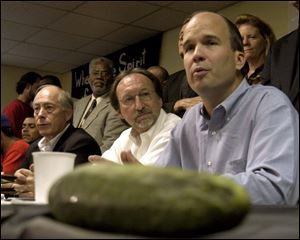
FLOC pact in North Carolina 'historic'
9/17/2004
With a cucumber lying on the table, Bill Bryan, president of Mt. Olive Pickle Co., talks to reporters; at left, is FLOC president Baldemar Velasquez; in the center is Stan Eury, of the growers' group.
RALEIGH, N.C. - "I am one pickle packer who is glad to be out of a pickle," said Bill Bryan, president of the Mt. Olive Pickle Co., the nation's second largest pickle producer.
The company, the Toledo-based Farm Labor Organizing Committee, and the North Carolina Growers Association signed an agreement that ended the union's five-year-old boycott against the Mt. Olive.
It provides for better wages and working conditions for the migrant workers and for potentially higher prices paid to participating farmers by Mt. Olive, which is based in Mount Olive, N.C., about 70 miles southeast of Raleigh.
In all, the agreement with Mt. Olive and a related union and farmer agreement could cover as many as 8,000 workers at more than 1,000 North Carolina farms for a variety of products, from pickles to tobacco. FLOC has sought the accords since 1999.
Signers at the the Community United Church of Christ in Raleigh were flanked by migrant workers wearing shirts that read "Hasta la victoria!" or "Until victory!"
FLOC had contended that cucumber growers were exploiting migrant workers by paying less than minimum wage, providing substandard housing, and blacklisting workers who complained about working conditions.
Organized labor, religious, and social justice organizations joined FLOC's protest. Boycott endorsements came from the AFL-CIO, National Council of Churches, and others.
Bob Edgar, general secretary of the church council, attended the signing and jovially offered Mr. Bryan $20 for pickles.
Mt. Olive products were pulled from shelves at several grocery stores nationally, including Kroger and Farmer Jack in Ohio.
"It was the pressure of the boycott," said Baldemar Velasquez, FLOC president. "There was so much scrutiny, attention, shedding light on the abuses in agriculture. Eventually they had to do something to make it go away."
Mr. Bryan said that, while he disagreed with the tactics employed by the union, he respected its perseverance and was pleased to resolve the issue.
"It's been a long wait," he said. "But you can enjoy some good Mt. Olive Pickle products."
Although the Toledo union and Mt. Olive representatives have periodically negotiated for years, real progress began this summer when the North Carolina Growers Association invited FLOC representatives to an open dialogue.
Stan Eury, association president, said that support for an agreement had grown significantly among farmers. He characterized the agreement as "the most progressive agricultural worker-employer accord in the nation."
Mr. Velasquez said major points of contention were issues of hiring, blacklisting, and grievance procedures.
The contract includes clauses that guarantee union representation for the workers; creates a grievance process for workers; establishes that a neutral party will be used to resolve disputes between the union and farmers; and allows the union to request reports of chemicals and pesticides used in the fields.
It also provides for higher wage rates and gives workers at least a half-day of rest after working seven consecutive days.
Mexicans yesterday celebrated their independence from the Spanish, and FLOC organizer Leticia Zavala called the signing "a new Mexican Independence Day."
About 2,500 migrant workers have signed union cards, but many more are expected. The agreement authorizes the employers to deduct union dues from their paychecks.